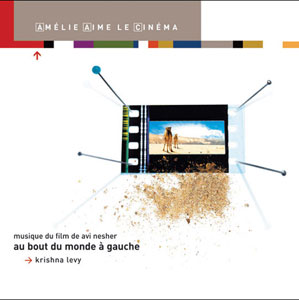Au Bout du Monde a Gauche
Music composed, conducted, and orchestrated by Krishna Levy
Performed by Unnamed Ensemble, featuring Jacky Tricoire (solo guitar), Herve Cavelier (solo violin), Manu Lacordeur (percussion) and Tony Bonfils (bass).
Produced by Amelie de Chassey
Available on Amelie Aime le Cinema (AIM -3094032)
Running Time: 46:32

See also:
Je Suis Un Assassin A piece of music with a title carries the preconceptions of that title. Without that label, it doesnít have meaning in the way the labelled piece did. And so Krishna Levyís fine score to this Avi Nesher film confronts me with a dilemma I havenít often come across with soundtrack albums. How much does a set of track titles enrich the experiencing of listening to a score? Now I havenít seen the film in question here Ė which is usually the case these days Ė but I find even in such cases, a basic knowledge of the filmís premise combined with titles for each of the thirty or so tracks gives me something of how the music corresponds to the story, inevitably enriching my appreciation of the score.
With this release from Amelie Aime le Cinema, those who seek even the suggestive narrative of approximate translations of French track titles are destined for frustration, as there are no track titles anywhere in the well-appointed liner notes. No track times for each trackÖ No concession at all to the listener that despite the language barrier might have googled the track titles in an attempt to structure to music in their own head. There is a long interview with the talented Krishna Levy, but thatís (understandably for the local market) in French. So all the international soundtrack collector has is the digipak. I donít want to overdo it, but this lapse in production values does make it harder to get into the score.
Nonetheless I give this album three and a half stars. Because it is fine music Ė a rich blend of comedic and dramatic underscore for an uncredited orchestra that recalls Rachel Portman and George Fentonís lush orchestral film music at times, Patrick Doyleís Gosford Park at others. Itís impossible to describe particular tracks (ok, enough of that), but at the very least I can talk about the range of material here. Cascading piano over strings sets up a sombre theme in the first track, an almost Eastern European idea that returns in many forms throughout the score. The later tracks (particularly the wrenching final cue) take up this sombre aspect in particular with a small (slightly undermixed) male choir lending subtle support. More often the tone is sly Ė one of the most memorable recurring themes is a faux pompous march with brass band accompaniment to a sinuous fiddle melody (a nice rearrangement of the main theme). Thereís also a guitar-and-clarinet led foxtrot that pops up from time to time. While the tracks driven by more exotic percussion and vocals (the language seems like Hebrew) break with what is otherwise a very traditional idiom for a film score, those tracks help break up the mood a bit.
Overall the album is a little long, with twenty-nine tracks varying in length from four minutes (the impressive closing cue) to eighteen seconds, and it feels like even at forty-six minutes this amiable score outdoes its welcome. But itís very attractive material, and despite my qualms about the missing track titles and redundancy, still comes with a recommendation to those who like orchestral scores that alternate between playful and dramatic moods. With the spare chromaticism of Je Suis Un Assassin, the kitschy splendour of Ozonís 8 Femmes and the whimsical comedy-drama of this score under his belt, Krishna Levy has demonstrated his knack for meeting a range of film music challenges, and is a name worth looking for in future French film scoring.
Michael McLennan
3.5
Return to Reviews Index